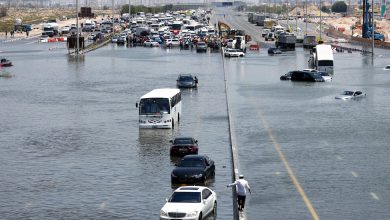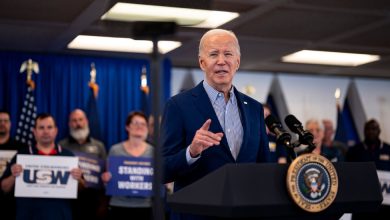The I.M.F. warns that a global recession could soon be at hand.

The International Monetary Fund warned on Tuesday that the world could soon be on the brink of a global recession as economic slowdowns in the United States, Europe and China along with twin food and energy crises weighed heavily on growth.
In an update of the World Economic Outlook, the I.M.F. said economic prospects had darkened significantly in recent months as war in Ukraine, inflation and a resurgent pandemic inflicted pain on every continent. If the thicket of threats continues to intensify, the world economy faces one of its weakest years since 1970, a period of intense stagflation across the globe.
“The world may soon be teetering on the edge of a global recession, only two years after the last one,” Pierre-Olivier Gourinchas, the I.M.F.’s chief economist, wrote in a blog post accompanying the report.
The I.M.F. downgraded its global growth forecasts from its April projections, predicting that output will fall to 3.2 percent in 2022, from 6.1 percent last year. With central banks around the world raising interest rates to tame inflation, growth is expected to slow further next year.
Inflation is also rising more rapidly and broadly than the I.M.F. anticipated earlier this year. It now expects prices to rise 6.6 percent in rich countries and 9.5 percent in emerging markets and developing economies.
8 Signs That the Economy Is Losing Steam
Worrying outlook. Amid persistently high inflation, rising consumer prices and declining spending, the American economy is showing clear signs of slowing down, fueling concerns about a potential recession. Here are other eight measures signaling trouble ahead:
Retail sales. The latest report from the Commerce Department showed that retail sales fell 0.3 percent in May, and rose less in April than initially believed.
Consumer confidence. In June, the University of Michigan’s survey of consumer sentiment hit its lowest level in its 70-year history, with nearly half of respondents saying inflation is eroding their standard of living.
The housing market. Demand for real estate has decreased, and construction of new homes is slowing. These trends could continue as interest rates rise, and real estate companies, including Compass and Redfin, have laid off employees in anticipation of a downturn in the housing market.
Start-up funding. Investments in start-ups have declined to their lowest level since 2019, dropping 23 percent over the last three months, to $62.3 billion.
The stock market. The S&P 500 had its worst first half of a year since 1970, and it is down nearly 19 percent since January. Every sector of the index beyond energy is down from the beginning of the year.
Copper. A commodity seen by analysts as a measure of sentiment about the global economy — because of its widespread use in buildings, cars and other products — copper is down more than 20 percent since January, hitting a 17-month low on July 1.
Oil. Crude prices are up this year, in part because of supply constraints resulting from Russia’s invasion of Ukraine, but they have recently started to waver as investors worry about growth.
The bond market. Long-term interest rates in government bonds have fallen below short-term rates, an unusual occurrence that traders call a yield-curve inversion. It suggests that bond investors are expecting an economic slowdown.
The economic storm facing the world is the result of diminished consumer spending power in the United States, the impact of Russia’s invasion of Ukraine on Europe’s economies, and the property crisis and lockdowns in China, where Beijing continues to take severe measures to contain coronavirus outbreaks.
The I.M.F. underscored that its forecasts are subject to considerable uncertainty and that more downgrades could come. It pointed to the prospect of a sudden shutdown of Russian gas flows to Europe, the stubborn persistence of inflation and more widespread lockdowns in China as looming threats.
“Under this scenario, both the United States and the euro area experience near-zero growth next year, with negative knock-on effects for the rest of the world,” Mr. Gourinchas said.
According to the report, the likelihood of a global recession is rising. It said the probability of a recession starting in one of the Group of 7 advanced economies was now nearly 15 percent, four times higher than its usual level. And it said some indicators suggested that the United States was already in a “technical” recession, which the I.M.F. defines as two consecutive quarters of negative growth.
Data released on Thursday is expected to show that the U.S. economy grew little or perhaps shrank in the second quarter of 2022.
The Federal Reserve is expected to raise interest rates by three-quarters of a percentage point on Wednesday as it tries to slow the economy and tame rapid inflation. While the Fed is aiming for a “soft landing” — in which it cools the economy just enough without tipping it into a recession — policymakers have acknowledged that pulling that off will be a challenge.
The darkening economic prospects in the United States and abroad pose trouble for President Biden and his Democratic Party ahead of midterm elections that will determine who controls Congress.
On Monday, Mr. Biden made the case that the United States was not in a recession and that its economy remained strong.
Understand Inflation and How It Impacts You
- Inflation 101: What’s driving inflation in the United States? What can slow the rapid price gains? Here’s what to know.
- Inflation Calculator: How you experience inflation can vary greatly depending on your spending habits. Answer these seven questions to estimate your personal inflation rate.
- Managing Your Finances: With interest rates rising, now is a good time to pay down credit card balances and bolster emergency savings.
- Changing Behaviors: From driving fewer miles to downgrading vacations, Americans are making changes to their spending because of inflation. Here’s how five households are coping.
“We’re not going to be in a recession, in my view,” he said, pointing to the low jobless rate and expressing hope that growth will stay steady even as it slows. “God willing, I don’t think we’re going to see a recession.”
The I.MF. noted that growth in the United States had been weaker than expected in the first half of the year and that there was “significantly less momentum” in private consumption because of inflation and the expectation of higher borrowing costs.
In a twist, while the I.M.F. downgraded most economies, Russia’s economy is now expected to shrink 6 percent this year rather than the previously forecast 8.5 percent. The I.M.F. said that Russian oil and nonenergy exports were holding up better than expected and that Western sanctions were not having as much bite as expected.
“Domestic demand is also showing some resilience thanks to containment of the effect of the sanctions on the domestic financial sector and a lower-than-anticipated weakening of the labor market,” the I.M.F. report said.



